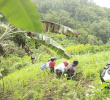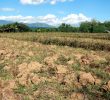DAVAO CITY — Foreign chambers in Davao want to transform Southern Mindanao from an agri-business to an agro-industrial and manufacturing growth corridor to generate growth and employment.
This move was lauded by both large and small local businesses, but the economic think-tank Ibon Foundation warned that the experience of other provinces relying on such foreign-investment led economy did not sustain employment and growth.
This growth corridor will be firmed up in the upcoming Southern Mindanao Growth Corridor Forum on September 19 which is expecting 30 foreign companies to signify interests in putting up operations from Davao del Sur to Davao Oriental.
This is pushed by the American Chamber of Commerce in the Philippines Davao (AmCham Davao), European Chamber of Commerce in the Philippines and Japan Chamber of Commerce in Mindanao.
Philip Dizon, chair of AmCham Davao, said the growth corridor aims to change the paradigm in Davao from an agri-business zone of bananas and coconuts into an industrial zone that will venture into manufacturing of electronics, recyclables and solar panels.
The European Chamber also said one of the investments they eye is the processing of coconut water which is in demand in the international market as a natural sports drink.
Dizon added that Davao Region has enough work force of around seven million that can be absorbed by the companies.
He said the concern of local big businesses is that not enough efforts have been made to promote Davao region.
“We see Davao City, Panabo, Tagum and Mati as an industrial destination hub. From General Santos to Mati we have seven million young potential workers. But why are we not in the radar of investments?” he asked.
The forum is co-sponsored by key business groups in Davao Region such as Floirendo’s Anflocor and Ayala’s Hijo Estates in Davao del Norte, the Aboitizes and Lapanday Corporation in Davao, and the Nakayama Company in Davao del Sur.
The growth corridor concept is also part of the Davao Regional Development Plan (2014-2016) of the National Economic and Development Authority (NEDA), where its industrial road map focuses on the development of agro-processing industries and manufacturing sector.
The push for the growth corridor is lauded by Davao City Chamber of Commerce President Antonio dela Cruz, who sees the effort to help match businesses with local small and medium enterprises.
“We can’t be mainly producers of raw materials, without value added on our products we are on the losing end. It will be a big advantage for us,” he said.
Ibon Foundation executive director Sonny Africa cautions that such growth as based on the experience of the Central Luzon growth corridor did not bring positive growth.
The Central Luzon corridor started in the late 1990s included six provinces : Zambales, Bataan, Pampanga, Tarlac, Bulacan and Nueva Ecija, and included infrastructure development such as air and sea ports, expanded highways, and other facilities.
Africa pointed out that even with a growth corridor, unemployment is still high in Central Luzon at 8.7% in 2013, which is above the reported national average of 7.1%, and daily basic salaries is P349 which is far below the living wage for the region.
“The main problem with so-called growth corridors is that they are mainly about creating the economic and physical conditions for big corporations and investors to develop and not really, despite any rhetoric, about developing Filipino farms and enterprises,” he pointed out.
The Ibon director also said basic issues of the workforce such as land equity and wages are skimmed by foreign investors.
“Growth corridors do not challenge inequities in land ownership or low wages and benefits and, if anything, are even premised on these remaining,” said Africa.
Africa warned that foreign chambers and domestic oligarchs express support of the growth corridor in Davao as they stand to gain more in returns of their investments at the expense of cheap labor.
“Foreign business will speak richly of developing the Southern Mindanao region and creating jobs. The reality however is that they are most of all concerned about their private profit-making and getting as much support as possible for this including not just providing infrastructure which is to be paid for out of public funds but also ensuring their free access to the land and natural resources of the region and their steady supply of educated cheap labor from the area,” he said. (davaotoday.com)










